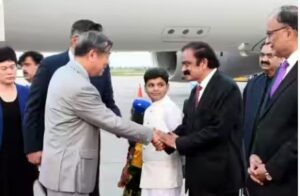
Chinese Vice Premier He Lifeng’s arrival in Islamabad, Pakistan on July 30 marks the 10th anniversary of the China-Pakistan Economic Corridor (CPEC), a significant component of Beijing’s Belt and Road Initiative (BRI). During his three-day visit until August 1, Vice Premier He, who is a member of the Politburo of the Central Committee of the Communist Party of China, will meet with Pakistan’s Prime Minister Shehbaz Sharif and President Arif Alvi.
Upon arrival, Vice Premier He was warmly received by Pakistan’s Planning Minister Ahsan Iqbal and Interior Minister Rana Sanaullah, along with officials from the Chinese embassy and Islamabad’s Ministry of Foreign Affairs, according to local media reports. The visit was a result of an invitation from the federal government of Pakistan and holds significant importance in China’s international economic relations and the implementation of the BRI.
The visit also highlights the commitment of both Pakistan and China to further strengthen their “All-Weather Strategic Cooperative Partnership.” In his previous role as the chairman of China’s National Development and Reform Commission, from 2017 to 2023, Vice Premier He played a crucial role in planning and executing multiple CPEC projects in Pakistan.
However, the Chinese official’s visit coincided with a tragic event – a deadly bomb blast at a Jamiat Ulema Islam-Fazl (JUI-F) convention in Khyber Pakhtunkhwa’s Bajaur district. The blast resulted in the death of at least 44 people and injured over 200 others. So far, no group has claimed responsibility, but local media reports suggest the Islamic State (IS) group’s involvement.
CPEC, which has attracted a total investment of $25.4 billion since its inception in 2013, encompasses massive transport, energy, and infrastructure projects across Pakistan. Nevertheless, it has faced hurdles and strains in recent years, leading to disruptions in CPEC projects. One significant concern has been security issues, particularly with the project passing through Pakistan-occupied Kashmir, which has been opposed by India. The influx of investments has also faced opposition from locals who claim they have not benefited from the projects.
Notably, Baloch separatists have carried out several attacks on CPEC projects, prompting Pakistan to deploy thousands of security personnel to safeguard Chinese interests. The security challenges have hindered the full functional potential of CPEC, according to Azeem Khalid, an assistant professor of international relations at COMSATS University Islamabad.
To address security concerns during Vice Premier He’s visit, Pakistan took stringent measures, including a two-day public holiday to keep people off the streets. Banners celebrating the CPEC anniversary and flags of both countries were displayed across the capital.
Looking back at the decade-long journey of CPEC, it has played a crucial role in transforming Pakistan’s infrastructure and connectivity with China. The corridor connects Gwadar Port in Pakistan’s Balochistan with China’s Xinjiang province, enabling enhanced trade and economic cooperation between the two nations. However, the ambitious project has faced both internal and external challenges.
In addition to security concerns, another obstacle has been the opposition from India, which views the CPEC passing through disputed territory as a violation of its sovereignty. This has further strained the already complex relationship between India and Pakistan. Nonetheless, China has reiterated its commitment to the project, emphasizing its purely economic and development-oriented nature.
As CPEC enters its second decade, both Pakistan and China remain determined to address the challenges and continue working together to enhance regional connectivity, trade, and economic growth. While security remains a top priority, efforts are being made to engage with local communities and address their concerns to ensure that the benefits of CPEC are more evenly distributed among the population.
Furthermore, both countries acknowledge the need for transparency, accountability, and sustainable practices to ensure the long-term success of the project. CPEC has the potential to be a game-changer not only for Pakistan and China but also for the broader region by fostering economic development and regional integration.
In conclusion, Vice Premier He Lifeng’s visit to Pakistan on the 10th anniversary of CPEC reaffirms the commitment of both nations to strengthen their bilateral ties and realize the full potential of this landmark economic corridor. As they address security and socio-economic challenges, their joint efforts have the potential to shape the future of regional cooperation and development in South Asia. By focusing on inclusive development and sustainable practices, the China-Pakistan Economic Corridor can become a model for successful international partnerships and contribute to a more prosperous and interconnected world.










